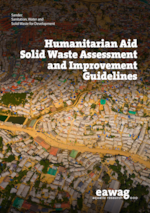Department Sanitation, Water and Solid Waste for Development
Humanitarian Aid Solid Waste Assessment and Improvement (HAWAI) Guidelines

Kutupalong Rohingya refugee camp near Cox's Bazar, Bangladesh. Azim Khan Ronnie / Alamy Stock Photo
Safe management of solid waste is essential for the protection of people’s health and the environment. This is of even higher importance in humanitarian contexts, where displaced or crisis-affected populations are especially vulnerable. Furthermore, the waste generated can significantly affect host locations where displaced communities are temporarily or indefinitely located.
The Humanitarian Aid Solid Waste Assessment and Improvement (HAWAI) Guidelines are designed to support effective Solid Waste Management (SWM) in humanitarian contexts. They provide practical actions and are seen as a complementary resource and companion publication to the Compendium of Solid Waste Management in Humanitarian Contexts (Ewers et al., 2025), which provides essential background on solid waste management, processes and technologies. The Compendium is also available through the online platform. The HAWAI Guidelines focus on assessing and improving key elements of the SWM service chain—such as waste storage, collection, transport, disposal, organic waste management, recycling, and self-management. They emphasise the importance of reliable baseline data as the foundation for planning and implementing improvements and provide step-by-step recommendations for enhancing existing systems, as well as for planning and designing new SWM systems.
Humanitarian phase:
This guide includes tools that assist in situations where the first rapid response phase of a humanitarian emergency has somewhat stabilised, and medium- and long-term measures are required. Nonetheless, some help in this guide is also relevant for acute response, for instance, to establish initial SWM services when none are present.
Target audience:
- Technical and management staff from governmental, local, national, international, and multilateral organisations involved in humanitarian operations
- Academic institutions, capacity-building agencies, the private sector, donors, and stakeholders from other sectors and humanitarian clusters that intersect with SWM.



